Top Ten Scientists You Would Most Want as a Teacher
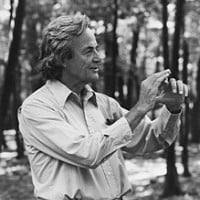 Richard Phillips Feynman was an American theoretical physicist known for his work in the path integral formulation of quantum mechanics, the theory of quantum electrodynamics, and the physics of the superfluidity of supercooled liquid helium, as well as in particle physics for which he proposed the parton model.
Richard Phillips Feynman was an American theoretical physicist known for his work in the path integral formulation of quantum mechanics, the theory of quantum electrodynamics, and the physics of the superfluidity of supercooled liquid helium, as well as in particle physics for which he proposed the parton model. The king of scientific charisma. A fun and fascinating experience it would truly be. Yay!
 Stephen William Hawking (January 8, 1942 - March 14, 2018) was an English theoretical physicist, cosmologist, author and Director of Research at the Centre for Theoretical Cosmology within the University of Cambridge. His most famous research was on the theory of Black Holes.
Stephen William Hawking (January 8, 1942 - March 14, 2018) was an English theoretical physicist, cosmologist, author and Director of Research at the Centre for Theoretical Cosmology within the University of Cambridge. His most famous research was on the theory of Black Holes. How is this not 1, he is considered almost equal to Einstein?
I choose you professor Hawking to teach us!
Life just got interesting...
 Albert Einstein (14 March 1879 – 18 April 1955) was a German-born theoretical physicist, widely acknowledged to be one of the greatest and most influential physicists of all time. Einstein is best known for developing the theory of relativity, but he also made important contributions to the development of the theory of quantum mechanics. Relativity and quantum mechanics are together the two pillars... read more
Albert Einstein (14 March 1879 – 18 April 1955) was a German-born theoretical physicist, widely acknowledged to be one of the greatest and most influential physicists of all time. Einstein is best known for developing the theory of relativity, but he also made important contributions to the development of the theory of quantum mechanics. Relativity and quantum mechanics are together the two pillars... read more Absolutely! But my eyes did keep wondering to Stephen Hawkin too...
Albert Einstein is one of my favourite philosophers. What a tremendous brain!
The particularly wonderful thing about this gentleman: He could explain things simply!
I think we can all argue that this would be awesome.
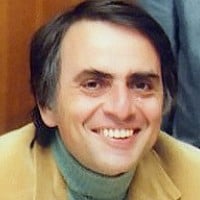 Carl Edward Sagan was an American astronomer, cosmologist, astrophysicist, astrobiologist, author, science popularizer, and science communicator in astronomy and other natural sciences.
Carl Edward Sagan was an American astronomer, cosmologist, astrophysicist, astrobiologist, author, science popularizer, and science communicator in astronomy and other natural sciences. Upon cosmology and astrophysics, yes please!
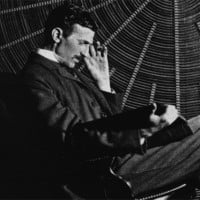 Nikola Tesla was a Serbian-American inventor, electrical engineer, mechanical engineer, physicist, and futurist best known for his contributions to the design of the modern alternating current electricity supply system, X rays, Radio, Remote Control, Laser, and Electric motors. Tesla developed and used fluorescent bulbs in his lab some 40 years before industry “invented” them. Nikola Tesla had perhaps thousands of other ideas and inventions that remain unreleased.
Nikola Tesla was a Serbian-American inventor, electrical engineer, mechanical engineer, physicist, and futurist best known for his contributions to the design of the modern alternating current electricity supply system, X rays, Radio, Remote Control, Laser, and Electric motors. Tesla developed and used fluorescent bulbs in his lab some 40 years before industry “invented” them. Nikola Tesla had perhaps thousands of other ideas and inventions that remain unreleased. Very smart, but not as smart as a couple of other names listed here.
Smartest man ever lived...
 Niels Henrik David Bohr was a Danish physicist who made foundational contributions to understanding atomic structure and quantum theory, for which he received the Nobel Prize in Physics in 1922. Bohr was also a philosopher and a promoter of scientific research.
Niels Henrik David Bohr was a Danish physicist who made foundational contributions to understanding atomic structure and quantum theory, for which he received the Nobel Prize in Physics in 1922. Bohr was also a philosopher and a promoter of scientific research. This would be an amazing thing to see.
 Michael Faraday was an English scientist who contributed to the study of electromagnetism and electrochemistry.
He is known for inventing the first rubber balloon and the first faraday cage.
Michael Faraday was an English scientist who contributed to the study of electromagnetism and electrochemistry.
He is known for inventing the first rubber balloon and the first faraday cage.
I may have my mind set on physics, and may have stopped biology, but I must say that he would be a great teacher.
An international treasure whose sheer enthousiasm for knowledge is infectious.
 Marie Skłodowska Curie, born Maria Salomea Skłodowskap, was a Polish and naturalized-French physicist and chemist who conducted pioneering research on radioactivity.
Marie Skłodowska Curie, born Maria Salomea Skłodowskap, was a Polish and naturalized-French physicist and chemist who conducted pioneering research on radioactivity. William Sanford "Bill" Nye, popularly known as Bill Nye the Science Guy, is an American science educator, television presenter, and mechanical engineer.
William Sanford "Bill" Nye, popularly known as Bill Nye the Science Guy, is an American science educator, television presenter, and mechanical engineer. He technically already teaches us, but having to meet him in PERSON if he was my teacher would be phenomenal.
 Neil deGrasse Tyson is an American astrophysicist, author, and science communicator. Since 1996, he has been the Frederick P. Rose Director of the Hayden Planetarium at the Rose Center for Earth and Space in New York City.
Neil deGrasse Tyson is an American astrophysicist, author, and science communicator. Since 1996, he has been the Frederick P. Rose Director of the Hayden Planetarium at the Rose Center for Earth and Space in New York City. Dorothy Mary Hodgkin, known professionally as Dorothy Crowfoot Hodgkin or simply Dorothy Hodgkin, was a British biochemist who developed protein crystallography, for which she won the Nobel Prize in Chemistry in 1964.
Dorothy Mary Hodgkin, known professionally as Dorothy Crowfoot Hodgkin or simply Dorothy Hodgkin, was a British biochemist who developed protein crystallography, for which she won the Nobel Prize in Chemistry in 1964. She deserves a lot more attention in today's society
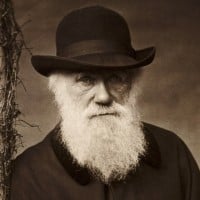 Charles Robert Darwin ( 12 February 1809 – 19 April 1882) was an English naturalist, geologist and biologist, best known for his contributions to evolutionary biology. His proposition that all species of life have descended from a common ancestor is now widely accepted and considered a fundamental concept in science. In a joint publication with Alfred Russel Wallace, he introduced his scientific theory that this branching pattern of evolution resulted from a process that he called natural selection, in which the struggle for existence has a similar effect to the artificial selection involved in selective breeding. Darwin has been described as one of the most influential figures in human history, ...read more.
Charles Robert Darwin ( 12 February 1809 – 19 April 1882) was an English naturalist, geologist and biologist, best known for his contributions to evolutionary biology. His proposition that all species of life have descended from a common ancestor is now widely accepted and considered a fundamental concept in science. In a joint publication with Alfred Russel Wallace, he introduced his scientific theory that this branching pattern of evolution resulted from a process that he called natural selection, in which the struggle for existence has a similar effect to the artificial selection involved in selective breeding. Darwin has been described as one of the most influential figures in human history, ...read more.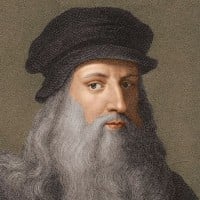 Leonardo di ser Piero da Vinci (April 15, 1452 - May 2, 1519) more commonly Leonardo da Vinci or simply Leonardo, was an Italian polymath whose areas of interest included invention, painting, sculpting, architecture, science, music, mathematics, engineering, literature, anatomy, geology, astronomy, botany, writing, history, poetry, and cartography.
Leonardo di ser Piero da Vinci (April 15, 1452 - May 2, 1519) more commonly Leonardo da Vinci or simply Leonardo, was an Italian polymath whose areas of interest included invention, painting, sculpting, architecture, science, music, mathematics, engineering, literature, anatomy, geology, astronomy, botany, writing, history, poetry, and cartography. Galileo Galilei, was an Italian astronomer, physicist, engineer, philosopher, and mathematician who played a major role in the scientific revolution during the Renaissance.
Galileo Galilei, was an Italian astronomer, physicist, engineer, philosopher, and mathematician who played a major role in the scientific revolution during the Renaissance.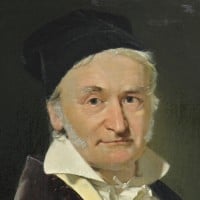 Johann Carl Friedrich Gauss was a German mathematician who contributed significantly to many fields, including number theory, algebra, statistics, analysis, differential geometry, geodesy, geophysics, mechanics, electrostatics, astronomy, matrix theory, and optics.
Johann Carl Friedrich Gauss was a German mathematician who contributed significantly to many fields, including number theory, algebra, statistics, analysis, differential geometry, geodesy, geophysics, mechanics, electrostatics, astronomy, matrix theory, and optics. Just look this guy up. He's incredible.
 Sir Isaac Newton PRS was an English physicist and mathematician who is widely recognised as one of the most influential scientists of all time and a key figure in the scientific revolution.
Sir Isaac Newton PRS was an English physicist and mathematician who is widely recognised as one of the most influential scientists of all time and a key figure in the scientific revolution.
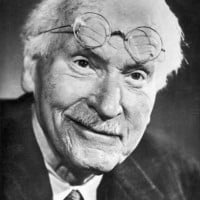
 Werner Karl Heisenberg was a German theoretical physicist and one of the key pioneers of quantum mechanics.
Werner Karl Heisenberg was a German theoretical physicist and one of the key pioneers of quantum mechanics. Aryabhata or Aryabhata I was the first of the major mathematician-astronomers from the classical age of Indian mathematics and Indian astronomy.
Aryabhata or Aryabhata I was the first of the major mathematician-astronomers from the classical age of Indian mathematics and Indian astronomy.
 Sigmund Freud was an Austrian neurologist and the father of psychoanalysis, a clinical method for treating psychopathology through dialogue between a patient and a psychoanalyst.
Sigmund Freud was an Austrian neurologist and the father of psychoanalysis, a clinical method for treating psychopathology through dialogue between a patient and a psychoanalyst.
 Alan Mathison Turing was a pioneering English computer scientist, mathematician, logician, cryptanalyst and theoretical biologist.
Alan Mathison Turing was a pioneering English computer scientist, mathematician, logician, cryptanalyst and theoretical biologist.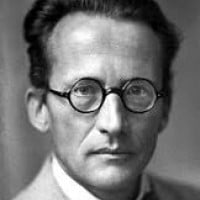 Erwin Rudolf Josef Alexander Schrödinger, sometimes written as Erwin Schrodinger or Erwin Schroedinger, was a Nobel Prize-winning Austrian physicist who developed a number of fundamental results in the field of quantum theory, which formed the basis of wave mechanics: he formulated the wave equation and revealed the identity of his development of the formalism and matrix mechanics.
Erwin Rudolf Josef Alexander Schrödinger, sometimes written as Erwin Schrodinger or Erwin Schroedinger, was a Nobel Prize-winning Austrian physicist who developed a number of fundamental results in the field of quantum theory, which formed the basis of wave mechanics: he formulated the wave equation and revealed the identity of his development of the formalism and matrix mechanics. Imagine Erwin explaining his famous paradox to kids hahaaha sounds funny!